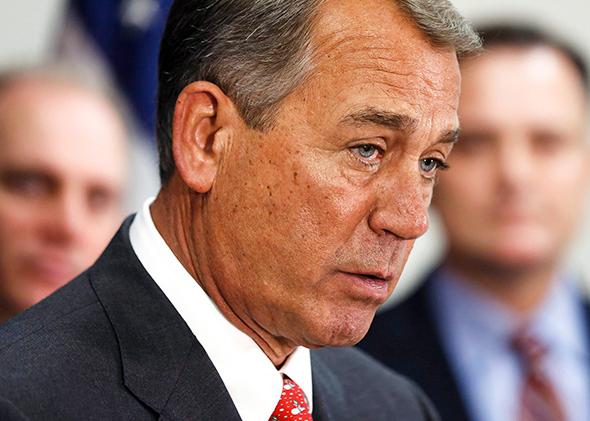By the end of Tuesday, House Republicans will have held their 56th vote to repeal the Affordable Care Act. At this point it’s a ritual, meant to satisfy new members who promised their constituents they’d vote for Obamacare’s repeal. And like the other votes, it won’t succeed—the Senate won’t act, and neither chamber has a veto-proof majority. But just because the vote is routine doesn’t make it insincere; Republicans still want to scrap the ACA and they’ll take any chance to do it.
It’s to their good fortune, then, that the Supreme Court might grant them an opening. If the court rules in favor of the challengers in King vs. Burwell, it will strip subsidies from the millions of Americans who purchase insurance through the federal health exchanges. If left to fester, this wound will likely destroy Obamacare and plunge the whole system into chaos, as insurance companies scramble to prevent a death spiral of sick patients and high costs.
Thankfully, however, there’s a way to treat the injury. With a simple patch—just a few lines of legislative language—lawmakers could stitch the damage and restore subsidies to the federal exchanges, precluding a disaster and actually saving lives in the process.
But this won’t happen, since for many Republicans, a Supreme Court blow to the Obamacare is an opportunity, not a problem.
“[King] alone is enough to bring down the health care law,” said Sen. John Barrasso of Wyoming, noting the effect on the ACA if the court strikes subsidies from the federal health exchanges. “We’re going to continue to try to one, repeal; two, strip out the worst parts of the law; and three, look to the courts.”
Senate Majority Leader Mitch McConnell of Kentucky had a similar take. “Who may ultimately take it down is the Supreme Court of the United States. … [Y]ou could have a mulligan here, a major do-over of the whole thing—that opportunity presented to us by the Supreme Court, as opposed to actually getting the president to sign a full repeal, which is not likely to happen.”
The honesty is refreshing. Why would you fix Obamacare when the court has handed you a final victory? And why would you save it when its forced collapse would vindicate your rhetoric? It’s not as if Republicans have been generous with praise; despite rising rates of insurance and slower growth in health care costs, Republicans still insist the law has been a failure, and refuse to give credit for any improvements in the health care system.
Indeed, if the court rules for the challengers, King vs. Burwell gives Republicans a chance to say I told you so and blame the collapse of the ACA on Democratic ineptitude, obscuring the extent to which the challenge was a deliberate attempt to sabotage the law.
For an ideological team trying to win, this is smart strategy. But for a political party trying to prove its mettle ahead of the next election, it’s terrible, irresponsible behavior. It’s also self-defeating. Thirty-six states don’t run exchanges and they’re mostly led by Republican governors and statehouses. And of the 5.4 million middle- and working-class people who buy insurance on those exchanges, 87 percent receive subsidies. In other words, even if Congress doesn’t act, Republicans will still be responsible for cleaning up the mess.
This is one reason why some Republicans are beginning to wonder what the party does if the King challengers win. “We’ve got a number of Republican senators who are talking,” says Tennessee Sen. Lamar Alexander, who chairs the Health, Education, Labor, and Pensions Committee. “We are talking with Reps. [Paul] Ryan and [Fred] Upton in the House. We want to be responsible about repairing any damage that Obamacare does. If it creates a shock to the system by causing 5 million Americans suddenly to put their insurance and their subsidies at risk, then we need to think if there’s anything we need to do.” Then again, Alexander continues, “Maybe there’s not.”
Maybe there’s not. That, I think, is the nut of the issue. For as much as there’s some Republican concern for the consequences of King vs. Burwell—even as they cheer the challengers—there are many more in the party who don’t care enough to bother with an alternative. All that matters for them is the win. Or, as North Carolina Sen. Richard Burr told Politico (in a voice that sounds flippant on the page), “As far as I’m concerned, if King vs. Burwell is struck down, the White House is the one responsible to say what they’re going to do next. … They’re the ones between a rock and a hard place because this is their plan.”
